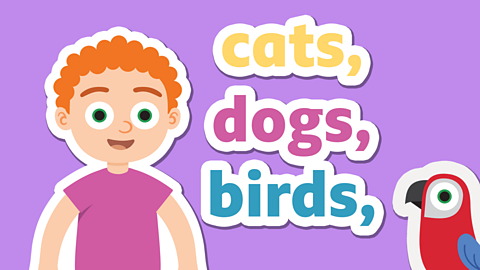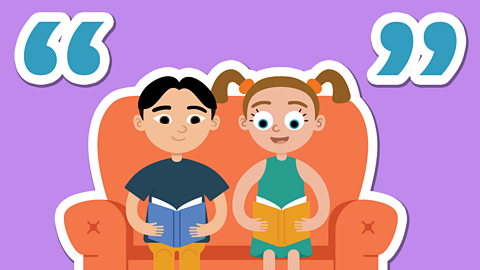Watch: How to use commas
In order to make your writing clear, you need to use commas.
As well as using them to separate out key information, or divide up different clauses, commas can also completely change the meaning of a sentence if they're not used correctly.
Watch this video to explore how commas are used.
Exploring the different ways to use commas
Four ways to use commas
1. Writing a list
When you're writing a list, use commas between each item in your list. Use and between the last two items, instead of a comma.
For example: Today I need to buy milk, bread, apples and potatoes.
2. Making your meaning clear
Adding a comma can change the meaning of a sentence completely, so it's important you put it in the right place.
For example: Let's eat Callum!
This means we're actually going to eat Callum!
Compare it with this: Let's eat, Callum!
A comma is used correctly after eat, so this means we're eating with Callum - phew!
3. Adding extra information
In longer sentences, you can use commas to separate out extra information (known as 'parenthesis') to make the sentence easier to read.
For example: Edinburgh, the capital city of Scotland, is famous for its castle.
4. Breaking up sentences
A clause is the building block for a sentence. Commas can be used to break up sentences that have more than one clause, to make them easier to read.
For example: When Albert saw the food, his tummy started to rumble.
This sentence has a subordinate clause: 'When Albert saw the food'.
Subordinate clauses do not make sense on their own because they need the main part of the sentence ('his tummy started to rumble') to be completely clear. When you have two clauses like these, they need to be separated by a comma.
When don't you need a comma?

If the clauses make sense on their own, you »ĺ´Ç˛Ô’t need to use a comma. Write the clauses as separate sentences instead.
For example:
Albert was excited about eating. He wanted to use a knife and fork.

Activity 1
Activity 2
Activity 3
Watch this clip of Chocolate Cake by Michael Rosen.
'Chocolate Cake' by Michael Rosen

1. Write a sentence about chocolate cake that includes commas in a list.
For example: Michael needed flour, cocoa, sprinkles and chocolate to bake a cake.
2. Now write a sentence about chocolate cake where a comma has been used to separate two clauses.
It might help to start your sentence with a subordinating conjunction, like whenever, however, although or after.
For example: “Whenever I think of chocolate cake, my tummy rumbles!”
3. Can you write three sentences to describe Michael’s chocolate cake adventure that uses commas to add extra information (parenthesis)?
For example: Michael, who was an inquisitive ten-year-old boy, loved chocolate cake.
Top tip!
Remember, a sentence should still make sense if the parenthesis is removed.

Activity 4
Look carefully at the four pictures below.

Now, write a sentence about each picture, using commas to show parenthesis. For example:
The fairy, who hovered above the ground, had a kind smile.
Remember to use a pair of commas to separate the parenthesis from the main clause within the sentence.
Play our fun English game Crystal Explorers. gamePlay our fun English game Crystal Explorers
Use grammar, punctuation and spelling skills to explore jungles, caves and tombs on your mission!

More on Punctuation
Find out more by working through a topic
- count3 of 12

- count4 of 12

- count5 of 12

- count6 of 12
